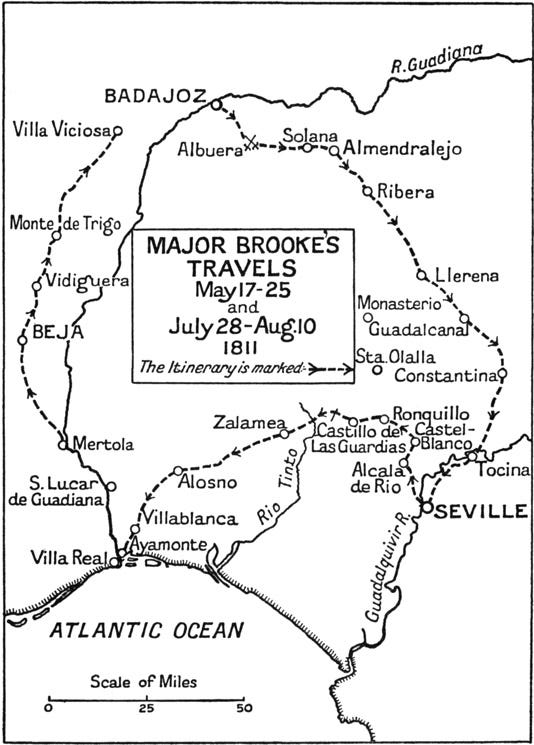10. Arrival in England (14)
August 9th. From Beja, past Vidigueira, to Monte de Trigo, through a most romantic fine country, well wooded. (I am inclined to think that Brooke has here made one stage of two, as Monte de Trigo is no less than forty miles from Beja, which seems an incredibly long journey, when the mountains are taken into consideration. He calls the stage nine leagues in an analysis of his itinerary appended at the close of his Journal, but it is far more. - Oman)
Coming to the brow of the hill, I discovered a wild fire running rapidly along the forest below for many thousand acres. I was sorry to see a number of birds of different kinds foolishly hovering over the flames, so low that their wings caught and they fell into it. Don Sunday told me afterwards that he had seen the bodies of partridges singed and roasted by the fire. I think the devastation had been caused by careless persons lighting a fire by the road-side, to cook their food. We left it burning furiously, and felt better contented when completely out of view of it.
We spent the night in trying to sleep, at a carrier’s house on the verge of a wood. Slumber was rendered impossible by the brawls and scuffling of a party of pedlars and muleteers, quarrelling over some stolen wine. They fought broadcast with fists and staves: I found Don Sunday lying at full length in a corner, to keep out of the way of the unruly combat.
August 10th. Rode to Villa Viciosa, the headquarters of my division, now under the command of General Hill. General Hill and the 2nd Division were at Villa Viciosa from July 30th to September 3, 1811, when they moved to Portalegre. I went immediately to his quarters; he had gone to rest, but his brother, Captain Clement Hill, knew my voice at the door, was much surprised, and called me in, to ask how I had escaped. He would not think of my going to any other quarters. I settled with the General for four days. Next morning I had the pleasure of meeting him. He showed me every mark of kindness, and sent for medical men, who found my wounds in such an alarming state that they advised I should go to England.
August 14th. Parted with the General on this morning. He attended me out on my road, and gave me at parting a basket with tea, sugar, bread, butter, and a large venison pasty. I was provided with mules by Commissary Brooke.
August 18th. Reached Aldea Gallega, where Mr. Moore of the Commissarat Department insisted on my dining with him, and sent me over to Lisbon in his own boat.
August 19th. The pains in my head had increased very much. On arriving at Lisbon I waited on the Medical Board, who passed me without delay for England. But before leaving I received Lord Wellington’s permission to proceed immediately to my native country.
August 27th. Embarked on board the Champion transport—Joseph Clinch, Master—and arrived at Portsmouth on September 28th, in a very bad state of health, both from the effects of fatigue and from many pieces of bone having sloughed out of my skull, both on my road through the mountains and during my passage to England. I performed a journey of upwards of 400 miles in Spain and Portugal, but at last had the happiness of meeting my family and friends, whose anxiety and uncertainty as to my fate were relieved by my arrival in England.
To obtain a deluxe leatherbound edition of STUDIES ON THE NAPOLEONIC WARS, subscribe to Castalia History.







A succinct and highly readable account of a fascinating adventure.